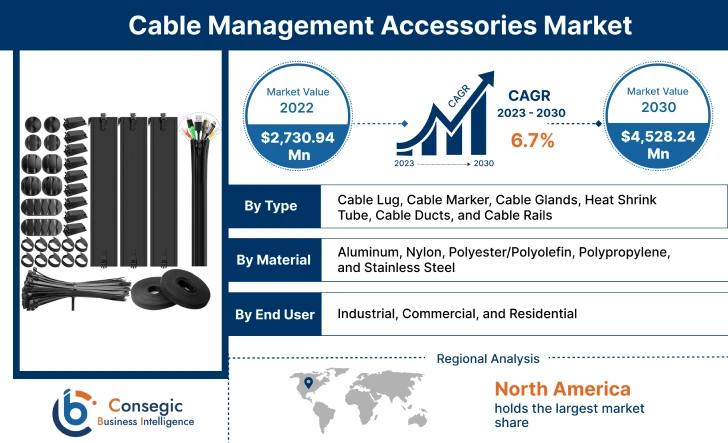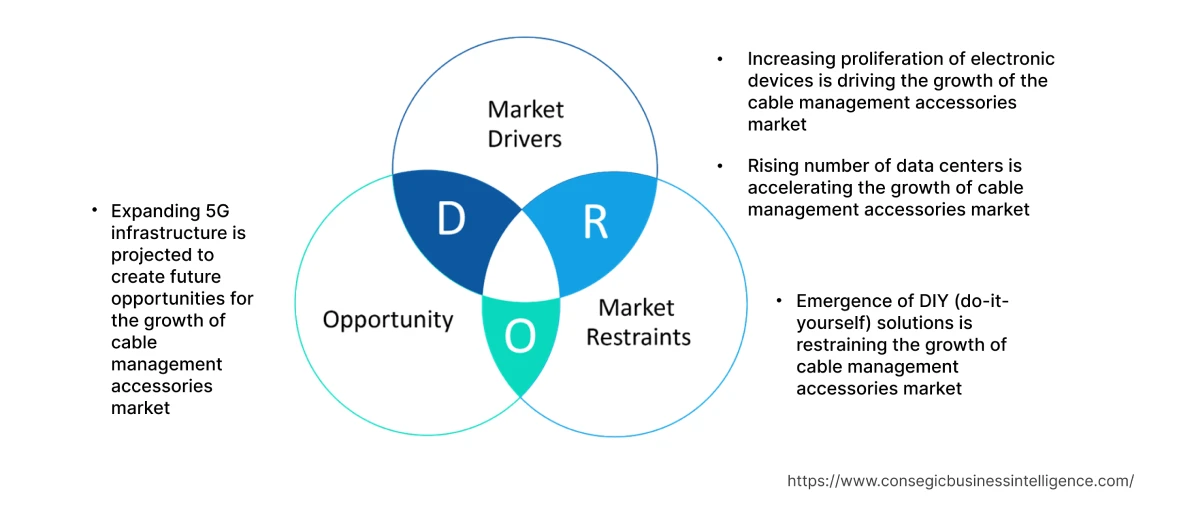Cable Management Accessories Market Introduction :
Global Cable Management Accessories Market Size is estimated to reach over USD 4,528.24 million by 2030 from a value of USD 2,730.94 million in 2022, growing at a CAGR of 6.7% from 2023 to 2030.
Cable Management Accessories Market Definition & Overview:
Cable management accessories refer to a range of products designed to organize, secure, and optimize the arrangement of cables and wires in various settings namely offices, data centers, homes, and industrial environments. The accessories include items such as cable ties, cable clips, cable raceways, cable sleeves, cable wraps, cable mounts, and cable organizers. Additionally, the accessories enable users to efficiently route and bundle cables, preventing tangling and damage, and facilitating easier maintenance and troubleshooting. Consequently, they play a crucial role in maintaining an efficient cable infrastructure while ensuring safety and promoting better performance of electrical systems.
Cable Management Accessories Market Insights :
Cable Management Accessories Market Dynamics - (DRO) :
Key Drivers :
Increasing proliferation of electronic devices
The rising number of electronic devices in homes, offices, and other environments is promoting the demand for cable management accessories to prevent the tangling of cable wires. The accessories including cable ties, clips, and raceways help users to organize and bundle cables, reducing clutter and improving aesthetics. Additionally, many electronic devices require interconnectivity with other devices namely charging cables, data transfer cables, and HDMI cables. The interconnected devices further raise the necessity for efficient cable management to ensure seamless connectivity and avoid issues including loose connections, data loss, and charging problems. Moreover, the rise of home entertainment systems, including large televisions, gaming consoles, sound systems, and streaming devices, necessitates the management of various cables for power, audio, video, and networking. The accessories ensure that the devices are interconnected properly, reducing the risk of signal interference and tripping hazards. Analysis of market trends concludes that the increasing number of electronic devices is contributing notably in accelerating the cable management accessories market demand. For instance, in August 2021, the United States Census Bureau stated that the revenue from electronics industry increased by 13.0% from USD 1,145.9 billion in 2018 to USD 1,295.3 billion in 2019. Additionally, the sales from e-commerce sites also grew by 14.3% from USD 506.1 billion in 2018 to USD 578.5 billion in 2019.
Rising number of data centers
Data centers are large-scale facilities that host a vast number of servers, networking equipment, and storage devices. The dense and intricate network of cables connecting the components requires scrupulous management. Cable management accessories, namely cable trays and cable ties help to route and secure cables effectively, reducing clutter and ensuring optimal performance. Additionally, the trend towards high-density computing and the deployment of more powerful servers in data centers results in a higher concentration of cables in limited spaces. The accessories are essential in managing the increased cable density to maintain proper airflow, prevent overheating, and minimize the risk of cable damage during maintenance. Analysis of market trends concludes that the increasing number of data centers contributes significantly in bolstering the cable management accessories market demand. For instance, according to the United States International Trade Commission report of May 2021, approximately 8,000 data centers are present globally, out of which 77% are located in OCED member states and 64% in NATO countries. Additionally, 2,600 data centers are present in the United States and North California encompasses maximum data-intensive firms including Uber, Google, Twitter, and Facebook which raises the demand for the market.
Key Restraints :
Emergence of DIY (do-it-yourself)
DIY solutions are perceived as cost-effective alternatives to purchasing cable management accessories. Cost-conscious consumers prioritize DIY solutions, leading to reduced requirement of commercial cable management products. Additionally, DIY solutions offer a similar level of cable organization, and provide the same level of effectiveness, organization, and safety as purpose-built accessories. Assessment of market trends suggests that the emergence of DIY solutions is hampering the market expansion.
Future Opportunities :
Expanding 5G infrastructure is projected to create future opportunities for the growth of the market
5G networks require a denser and more extensive network of cables to support higher data rates and low latency. Cable management accessories are utilized to organize and manage the complex cables in 5G base stations and communication hubs. Additionally, the deployment of 5G small cells and network densification leads to high-density cabling in urban areas. The accessories are designed to handle large quantities of cables and are essential for efficient installation and maintenance. Moreover, 5G infrastructure involves outdoor installations namely street-level small cells and aerial fiber deployments. They provide protection against harsh weather, physical damage, and UV radiation to ensure the longevity and reliability of the cabling infrastructure. Analysis of market trends concludes that the expanding 5G infrastructure is emerging as one of many cable management accessories market opportunities that will drive market expansion during the forecast period.
Cable Management Accessories Market Report Insights :
| Report Attributes | Report Details |
| Study Timeline | 2017-2030 |
| Market Size in 2030 | USD 4,528.24 Million |
| CAGR (2023-2030) | 6.7% |
| By Type | Cable Lug, Cable Marker, Cable Glands, Heat Shrink Tube, Cable Ducts, and Cable Rails |
| By Material | Aluminum, Nylon, Polyester/Polyolefin, Polypropylene, and Stainless Steel |
| By End-User | Industrial, Commercial, and Residential |
| By Region | North America, Europe, Asia Pacific, Latin America, and Middle East & Africa |
| Key Players | Schneider Electric, Cembre S.p.A., Eaton Corporation, HellermannTyton Group PLC, Emerson Electric Co., Panduit Corp., Partex Marking Systems, HELUKABEL Group, Weipu connector, Hawke International, CMP Products Limited |
Cable Management Accessories Market Segmental Analysis :
Based on the Type :
The type segment is classified into cable lug, cable marker, cable glands, heat shrink tube, cable ducts, and cable rails. In 2022, the Cable lugs segment accounted for the highest cable management accessories market share and comprise of pin cable lugs, ring cable lugs, tube cable lugs, and fork cable lugs. Cable lugs are designed to securely connect cables to various electrical equipment namely terminals, switches, circuit breakers, and power distribution systems. The lugs ensure a reliable and efficient transfer of electrical current between the cables and the connected devices, minimizing resistance and voltage drop. Additionally, cable lugs are highly versatile and are available in a wide range of from factors and configurations to accommodate different cable types, gauges, and applications. Moreover, high-quality cable lugs are manufactured from materials including copper, aluminum, and tinned copper to offer excellent conductivity, corrosion resistance, and mechanical strength. For instance, HELUKABEL Group launched HELU-S-RK-CU, a tubular cable lug made up of copper and the surface is plated with galvanic tin. The advanced copper material offers improved conductivity and also has excellent mechanical strength. Furthermore, cable lugs are able to withstand temperature of up to 120°C, thus suitable for outdoor applications. Consequently, the aforementioned factors are collectively responsible in driving the segment proliferation.
Cable markers are projected to witness the fastest CAGR in the during the forecast period. The growth is attributed to the expanding data centers and telecommunication infrastructure, driven by cloud computing, 5G, and IoT, which necessitates well-organized cable systems. Additionally, cable markers provide a systematic approach to cable identification, reducing the risk of human errors and improving operational efficiency. Moreover, in industries with stringent safety regulations and compliance standards including construction, healthcare, and manufacturing, cable markers are a crucial component. The markers are employed for maintaining accurate cable documentation and ensuring proper cable organization to prevent accidents and potential liabilities. In conclusion, the above-mentioned benefits offered by cable markers is projected to drive the cable management accessories market growth during the forecast period.
Based on the Material :
The material segment is bifurcated into aluminum, nylon, polyester/polyolefin, polypropylene, and stainless steel. In 2022, the Nylon segment accounted for the highest cable management accessories market share as nylon is known for exceptional strength-to-weight ratio and durability. Nylon accessories are capable of withstanding heavy loads, resist wear and tear, and provide reliable cable support even in demanding environments. Additionally, nylon exhibits good temperature resistance in both hot and cold conditions, hence nylon accessories are suitable for indoor and outdoor applications across diverse industries. For instance, JiGO launched nylon cable ties, capable of withstanding extreme temperatures of up to 2600 Celsius. Analysis of cable management accessories market trends concludes that the nylon cable ties are extensively utilized in cable and wire bundling applications and are resistant to wear and tear, thus contributing significantly in fueling the cable management accessories market growth.
Polypropylene material is anticipated to witness the fastest CAGR in the cable management accessories market during the forecast period. Polypropylene is resistant to numerous chemicals, acids, and alkalis, suitable for applications in various industrial and outdoor environments. Additionally, polypropylene is an electrical insulator, therefore polypropylene accessories are safe for use in electrical and electronic applications, reducing the risk of electrical hazards. Moreover, some polypropylene accessories are UV-stabilized, providing enhanced resistance to ultraviolet radiation. The feature ensures that cable accessories are deployed for outdoor applications without turning brittle due to sun exposure. Furthermore, polypropylene is resistant to moisture, humidity, and other weather conditions, hence ideal for both indoor and outdoor cable management applications. The cable management accessories market analysis concluded that the presence of characteristic chemical and UV properties is predicted to drive the adoption of polypropylene cable accessories for outdoor applications in the upcoming years.
Based on the End-User :
The end-user segment is trifurcated into industrial, commercial, and residential. Industrial segment accounted for the largest market share of 45.3% in 2022 as in industrial control panels and electrical cabinets, cable ties and cable glands help to organize numerous cables connected to switches and relays. Proper cable management ensures easy access to cables for maintenance and reduces the risk of accidental disconnections. Additionally, industrial automation and robotics involve complex cable networks for sensors, motors, and control systems. Cable management accessories are utilized to route, bundle, and protect cables, ensuring that the cables remain safely connected during automated processes. Moreover, in various industrial machinery and equipment, they are essential for arranging cables that power and control motors, sensors, and instrumentation. The accessories prevent cable tangling, reduce the risk of cable damage, and facilitate troubleshooting and maintenance. In conclusion, the aforementioned factors are collectively responsible in boosting the adoption of accessories in industrial sector.
Commercial sector is anticipated to witness the fastest CAGR in the cable management accessories market during the forecast period. The growth of the market is endorsed by the increasing adoption of the accessories in offices to organize and conceal cables from computers, printers, and networking equipment. Additionally, they facilitate the organization and concealment of cables for audio-visual equipment, projectors, and sound systems in conference rooms and presentation spaces. Furthermore, the accessories are also utilized in retail stores and commercial outlets to organize and secure cables for point-of-sale (POS) systems, digital signage, security cameras, and lighting fixtures. The cable management accessories market analysis concluded that the growing adoption of the accessories in commercial offices is projected to drive the market proliferation in the upcoming years.
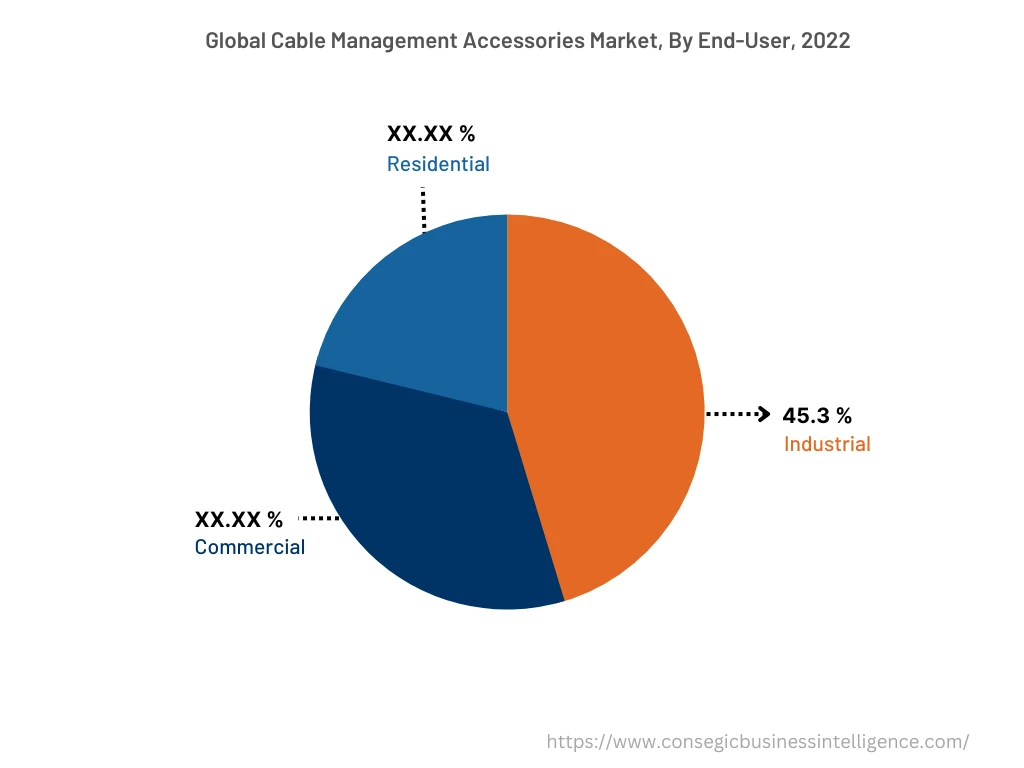
Based on the Region :
The regional segment includes North America, Europe, Asia Pacific, Middle East and Africa, and Latin America.
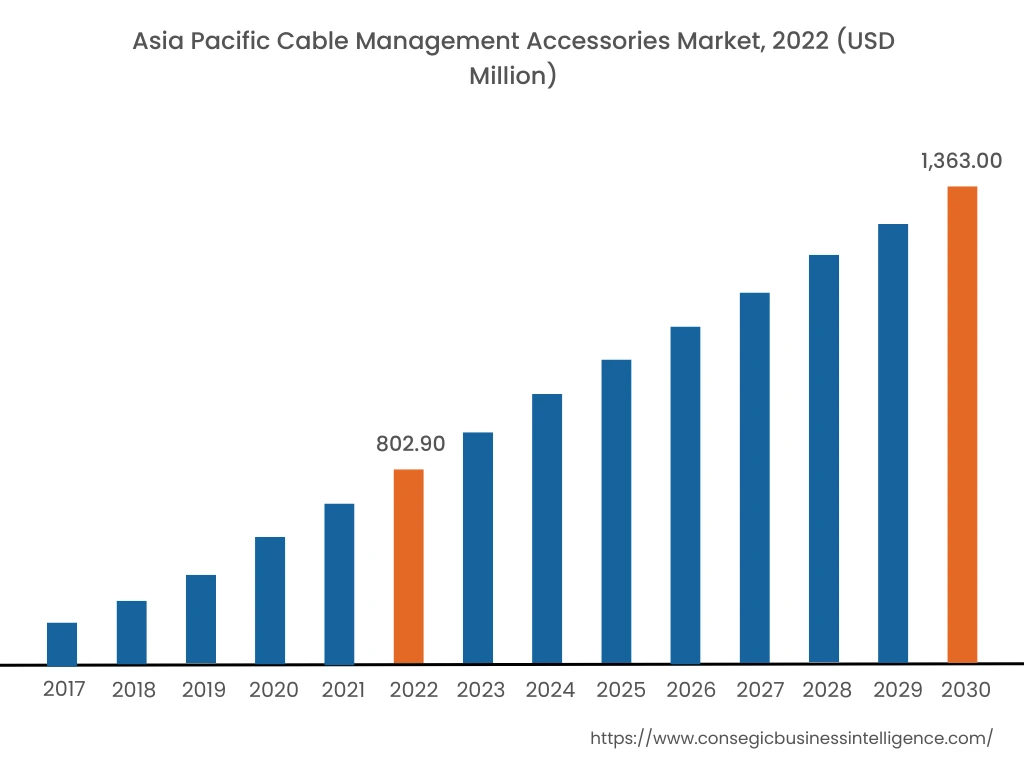
North America holds the largest market share in 2022 as the region is known for the early adoption of advanced technologies and solutions. Additionally, the industrial and commercial sectors in North America are robust and diverse, driving substantial demand for cable management accessories. Industries including manufacturing, energy, telecommunications, data centers, and IT pose a significant need for efficient cable organization, supporting the market expansion. Moreover, North America also has a well-developed infrastructure, including a vast network of data centers, power distribution systems, telecommunication networks, and commercial establishments. The extensive cable networks require a wide range of accessories, contributing to the region's dominance. Analysis of cable management accessories market trends concludes that the expanding industrial sector serves as the key factor responsible for accelerating the growth of market.
Asia Pacific accounted to USD 802.90 million in 2022 and is expected to reach USD 1,363.00 million in 2030 in the cable management accessories market and is expected to grow by highest CAGR of 7.0% during the forecast period. In addition, in the region, China accounted for the maximum revenue share of 33.5% in the year 2022. Asia Pacific countries are undergoing significant industrialization, with the development of manufacturing and infrastructure sectors. The development necessitates extensive cable networks, driving the demand for theaccessories to ensure efficient and safe cable organization. In addition, Asia Pacific countries are embracing advanced technologies, including 5G, Internet of Things (IoT), artificial intelligence, and smart city solutions. The technologies rely heavily on cable networks and create an increasing need for cable management accessories. Evaluation of market trends suggests that the increasing investment by telecom providers for the expansion of 5G networks also contributes remarkably in propelling the market growth. For instance, in January 2023, according to India Brand Equity Foundation (IBEF), Reliance Industries invested USD 24 billion for the rollout of 5G network and Bharti Airtel is expected to invest approximately USD 3.26 billion to USD 3.38 billion. The increasing investment by telecom operators in Asia Pacific countries, thus projected to accelerate the market proliferation in the region.
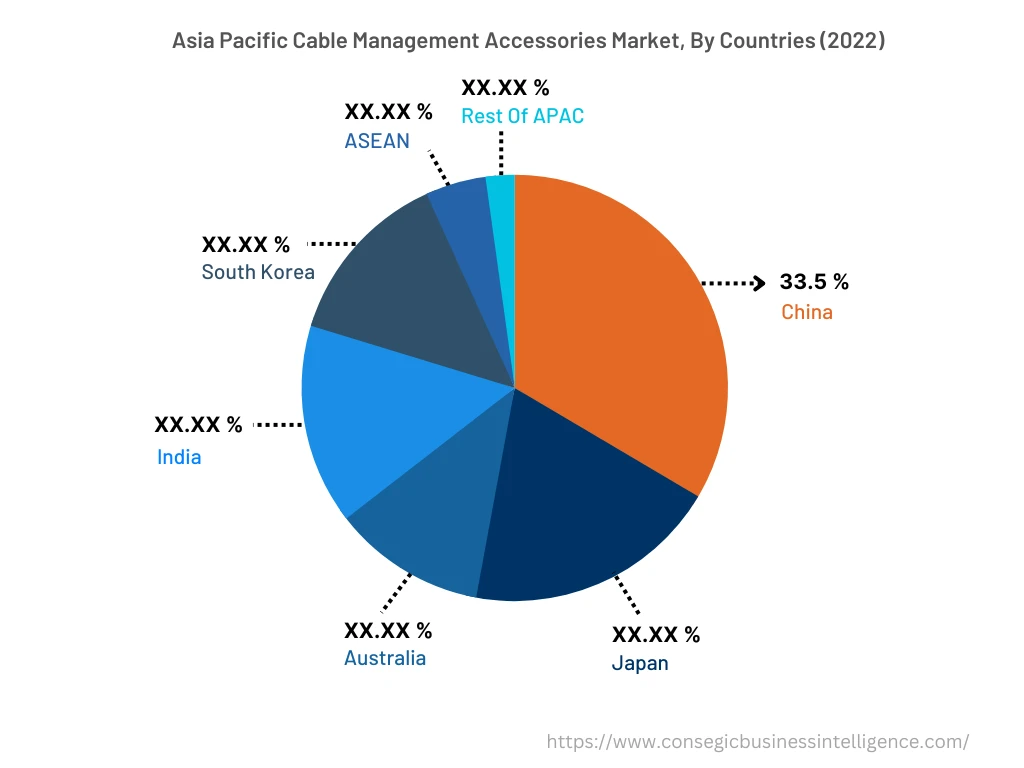
Top Key Players & Market Share Insights:
The landscape of the cable management accessories market is highly competitive and has been examined in the report, along with complete profiles of the companies operating in cable management accessories industry. In addition, the surge in innovations, acquisitions, mergers, and partnerships has further accelerated the growth of the market. Major players in the market include-
- Schneider Electric
- Cembre S.p.A.
- HELUKABEL Group
- Weipu connector
- Hawke International
- CMP Products Limited
- Eaton Corporation
- HellermannTyton Group PLC
- Emerson Electric Co.
- Panduit Corp.
- Partex Marking Systems
Recent Industry Developments :
- In May 2021, Hawke International launched Rapid Connection Gland (RCG) to offer rapid termination and disconnection solutions in a cost-effective manner.
- In July 2020, CMP Products Limited launched cord grip cable glands, specifically to suit unarmoured flexible cable and cord and also to provide excellent corrosion and ingress protection in various environmental conditions.
Key Questions Answered in the Report
What are cable management accessories? +
Cable management accessories refer to a range of products designed to organize, secure, and optimize the arrangement of cables and wires in various settings namely offices, data centers, homes, and industrial environments.
What specific segmentation details are covered in the cable management accessories market report, and how is the dominating segment impacting the market growth? +
Nylon dominates the market as nylon is known for exceptional strength-to-weight ratio and durability. Nylon cable management accessories are capable of withstanding heavy loads, resist wear and tear, and provide reliable cable support even in demanding environments.
What specific segmentation details are covered in the cable management accessories market report, and how is the fastest segment anticipated to impact the market growth? +
Polypropylene material is anticipated to witness the fastest CAGR in the cable management accessories market as the material is resistant to numerous chemicals, acids, and alkalis, suitable for applications in various industrial and outdoor environments.
Which region is anticipated to witness the highest CAGR during the forecast period, 2023-2030? +
Asia Pacific is anticipated to witness the fastest CAGR of 7.0% during the forecast period due to the increasing investment for the development of 5G telecom infrastructure.
